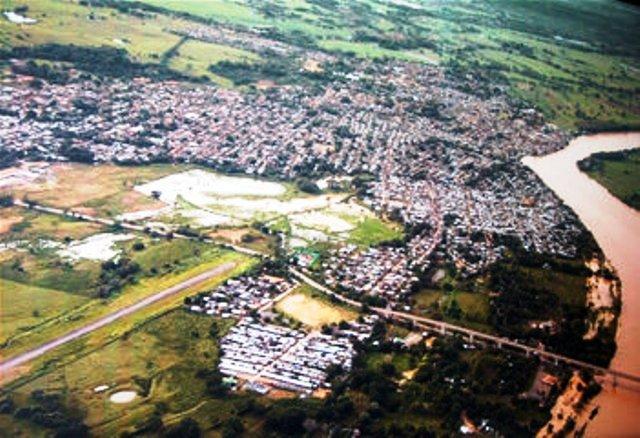Caucasia, Antioquia, Colombia
Suggest Place to Visit
1435
Track to location with GPS |
 |
The history of the municipality of Caucasia begins when in 1877 Law 50 on demarcation and territorial division of the state establishes Nechí as a district, on March 19 of the following year the president of the state, Teodomiro Llano, moved the head of Nechí to Margento. The following year their locality was removed from the native district and mine workers dispersed and created their own hamlets.
On April 12, 1886, Petrona Arrieta of Spanish descent and her children Clemente and Leopoldo Arrieta Viloria, reached a high and flat terrain full of cañafistuleros trees on the banks of the Cauca River, some 2 kilometers away from the village, and proposed to do some slash and build a ranch to settle; then other people arrive from the sites of Tangan and Boca de Man and from the savannas of Sucre and the region of La Mojana. The new hamlet is called Cañafistula, due to the large number of trees of this species that existed in the place.
At the beginning of this century, Cañafistula already had more than 60 straw ranches with the same number of families from the neighboring hillsides and other hamlets; On April 27, 1910, by agreement 04, Cañafistula was given the level of police inspection; In 1912, the town of Margento was created as the municipal seat and the towns called Nechí and Caucasia were under its administrative independence.
In 1927, Bishop Miguel Ángel Builes and the main civic leaders of the town of Cañafistula wanted to change the name from Cañafistula to Caucasia, and that same year it was approved by the Margento council and in May 1927 it was elevated to the category of township. In 1936, through the ordinance issued on May 22, 1936, the head of Margento was moved to Nechí. Here are leaders like the old Efraín Valencia, father of the current mayor (2009).
Due to the construction of the new western trunk road and the economic importance of Caucasia, it was decided in 1942 by ordinance 05 of July 7 of that year to end Nechi as a municipality and lastly of the same year, the municipal seat for Caucasia. Nechí and Margento became municipalities again in January 1982, segregating it from Caucasia and El Bagre.
Caucasia, Capital of Bajo Cauca Antioqueño, is a municipality of Colombia, located in the Bajo Cauca subregion of the department of Antioquia. It borders on the north with Montelíbano, a municipality belonging to the department of Córdoba, on the east with the Antioquia municipalities of Nechí and El Bagre, on the south with the municipality of Zaragoza, and on the west with the municipality of Cáceres.
The city of Caucasia is located north of Antioquia, on the border with the department of Córdoba and in the Antioquia subregion of Bajo Cauca. It is one of the most important municipalities in the area due to its privileged geographical location, near the confluence of important Colombian tributaries such as the Cauca River and the Nechí River.
The rural area of Caucasia is part of the Córdoba and Sucre savannah, in a place that is the confluence of the Paisa and Sabanera subcultures (coastal, giving rise to the Chilapa culture that combines characteristics of the two cultures).
Economy
The municipal economy revolves around livestock, fishing, agriculture and mining.
Caucasia became the largest gold producer in Colombia. Currently, the district occupies a preponderant place in the Bajo Cauca region of Antioquia, and is the largest producer of livestock in the subregion. The services sector is gaining strength, making Caucasia a commercial center that serves as a supplier of food for a wide geography.
The mining of (gold and silver) continues to occupy a part of the population. Likewise, the felling of trees for the manufacture of wooden goods does.
Tourism has become very popular in recent years, and architectural projects of national and international projection are being developed, such as shopping centers at the level of the best in the country.
Parties
Festivities: Immaculate Conception, on December 8.
Bocachico Festivities, in times of subienda, January and February.
Agricultural and Livestock, Bovine and Equine Fair, in December.
Party in Corraleja, in December.
Virgen del Carmen, on July 16.
Fiestas del Río, in January.
Vallenato Festival, November 11.
Gastronomy
Charcoal-grilled meats and Cayman meat at Los Caimanes Zoopark. Also famous are the corn buns, the bocachico widow, the cheese motes, the dry rice and the yam
Typical Paisa cuisine
International cuisine due to strong tourism.
Places of interest
Laguna Colombia
Margento swamps
Mother Park
Botanical Garden
UdeA University of Antioquia.
Comments
We don´t have yet any comments about:
Caucasia
Caucasia
Be the first to leave a comment as it is very important to inform other people
Outros locais a visitar
Within a radius of 20 km from:Caucasia
Unfortunately we do not have information on other places to visit in this area yet
Hotel reservation near Caucasia within a radius of 20 km
Why to book with TURIS BRASIL
The best prices
Our partnerships with the world´s largest operators offer research on the best market prices.
More options
At Rotas Turisticos you can book the hotel, buy the air ticket, book the transfer from the airport to the hotel and vice versa, book the local excursions, rent the car, take travel insurance and consult the places to visit and where to go.
Holiday Tips & Destinations
Hundreds of holiday destinations with all the options that allow you to easily choose the destination that best suits your dream vacation.
TURIS BRASIL
Links





